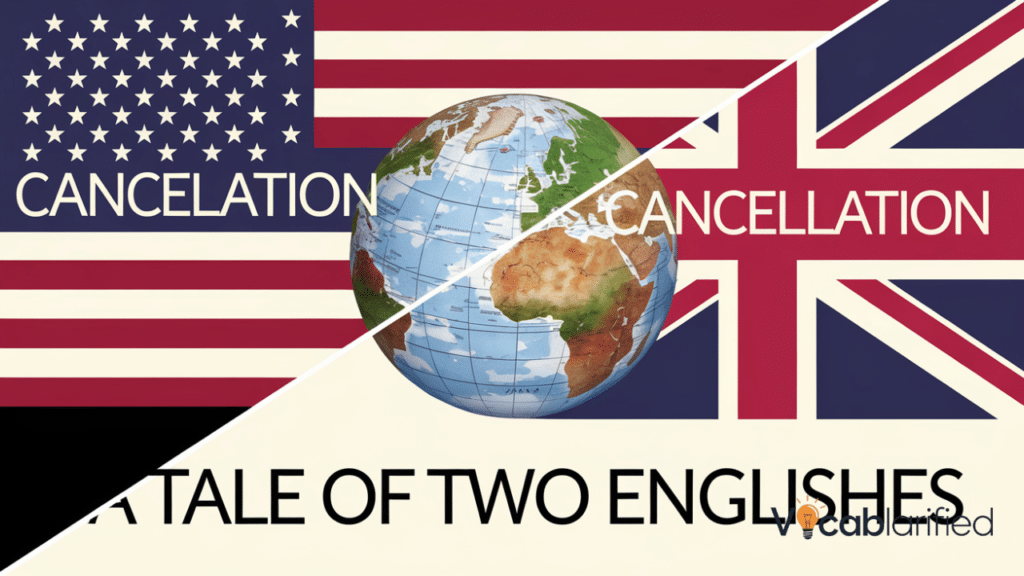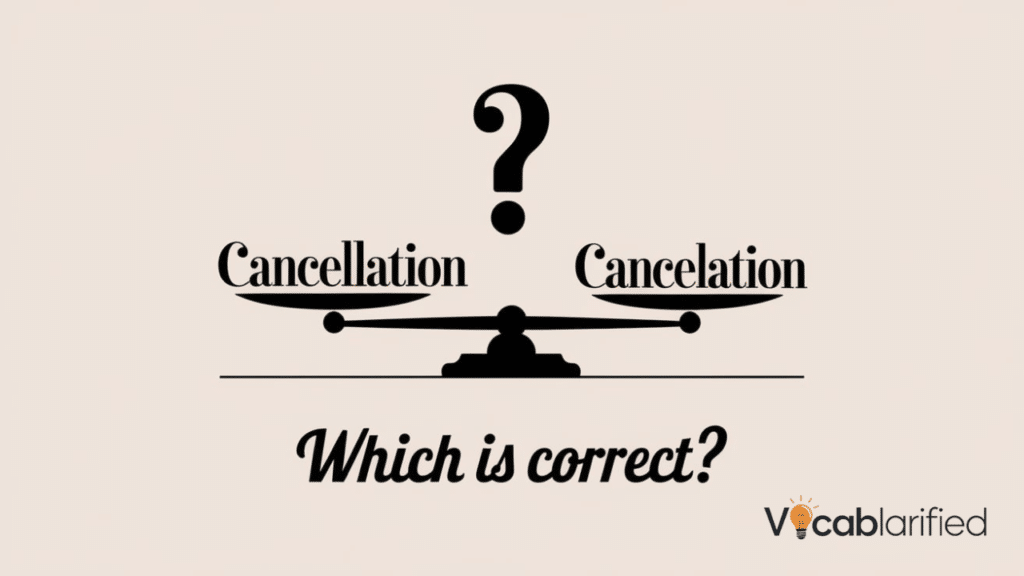In the world of writing and speaking, few topics spark as much debate as the correct spelling of words. One such word that often causes confusion is “cancellation” – or is it “cancelation”?
This article delves deep into the language nuances surrounding this common term, exploring its origins, usage, and the ongoing debate about its proper spelling.
A Tale of Two Spellings
The English language is full of quirks and inconsistencies, and the spelling of “cancellation” is no exception. Both “cancellation” and “cancelation” are used in everyday language, but which one is truly correct? The answer, as with many aspects of language, isn’t as straightforward as we might hope.

The Historical Context
To understand the debate, we need to look at the historical context of these spellings. The word “cancel” comes from the Latin “cancellare,” meaning to cross out or delete. Over time, this word made its way into English, bringing with it some spelling confusion.
Etymology and Evolution
The evolution of language is a fascinating process, and the case of “cancellation” vs. “cancelation” is no exception. As the English language spread across the globe, regional differences in spelling began to emerge. These differences were often influenced by local pronunciations and writing conventions.
You Might Like: Attornies Or Attorneys: Which Spelling Is Correct?
American English vs. British English
One of the key differences in the spelling of this word lies in the divide between American and British English. While both varieties of English share a common root, they have developed distinct characteristics over time, including differences in spelling.

The American Preference
In American English, there’s a tendency to simplify spellings. This trend, which began in the early 19th century, was championed by lexicographer Noah Webster. He believed that American English should have its own standardized spellings, distinct from British English.
The British Tradition
British English, on the other hand, tends to preserve traditional spellings. This conservative approach to orthography means that many words in British English retain spellings that reflect their etymological roots.
You Might Like: Arial or Aerial? Understanding The Differences
The Role of Double Consonants
The crux of the “cancellation” vs. “cancelation” debate lies in the doubling of the “l” before adding the suffix “-ation”. This is a common point of contention in English spelling, and understanding the rules can help shed light on the correct form.
Rules of Suffixation
When adding suffixes to words, there are rules that govern whether the final consonant should be doubled. These rules can vary between American and British English, adding another layer of complexity to the spelling debate.
Standard Spelling in Different Regions
While both spellings are used, there are some regional preferences that have emerged over time. Understanding these preferences can help writers choose the appropriate spelling for their audience.
American Usage
In the United States, the spelling “cancelation” (with one “l”) is becoming increasingly common. This aligns with the American tendency towards simplified spellings. However, it’s worth noting that “cancellation” is still widely used and accepted.
British and Commonwealth Usage
In Britain and many Commonwealth countries, “cancellation” (with two “l”s) remains the standard spelling. This adherence to the traditional spelling is consistent with British English conventions.
You Might Like: Priviledge Or Privilege: What Is The Correct Spelling?
The Impact of Technology
In our digital age, technology has had a significant impact on language use and spelling. Auto-correct features, spell-checkers, and online dictionaries have all played a role in shaping how we spell words like “cancellation”.

Digital Influence
The prevalence of digital communication has led to some interesting developments in the “cancellation” vs. “cancelation” debate. Search engines and auto-correct features often favor one spelling over the other, potentially influencing users’ choices.
Common Usage in Various Contexts
To better understand how these spellings are used in practice, let’s look at some common contexts where the word might appear. This will give us a sense of the practical examples of how these spellings are employed in real-world situations.
Business Communication
In professional settings, the choice between “cancellation” and “cancelation” can vary depending on the company’s style guide and regional preferences. Here’s a table showing how some major corporations use the term in their official communications:
| Company | Preferred Spelling | Context of Use |
|---|---|---|
| IBM | Cancellation | Service agreements |
| Microsoft | Cancelation | Software licenses |
| Apple | Cancellation | App Store policies |
| Amazon | Cancellation | Order cancellations |
| Cancelation | Ad campaign settings | |
| Cancellation | Account deactivation | |
| Netflix | Cancellation | Subscription termination |
| Uber | Cancelation | Ride cancellations |
| Airbnb | Cancellation | Booking cancellations |
| Spotify | Cancellation | Premium cancellations |
Legal Documents
In legal contexts, precision is crucial. The choice of spelling can have implications for the interpretation of contracts and other legal documents. Here’s a look at how different legal entities use the term:
| Legal Entity | Preferred Spelling | Document Type |
|---|---|---|
| U.S. Supreme Court | Cancellation | Court opinions |
| UK Parliament | Cancellation | Legislative texts |
| United Nations | Cancellation | International treaties |
| World Trade Organization | Cancellation | Trade agreements |
| European Union | Cancellation | EU regulations |
| International Criminal Court | Cancellation | Legal proceedings |
| American Bar Association | Cancelation | Legal publications |
| Law Society of England and Wales | Cancellation | Practice guidelines |
| Canadian Legal Information Institute | Cancellation | Case law databases |
| Australian Law Reform Commission | Cancellation | Legal reform proposals |
The Role of Style Guides
Style guides play a crucial role in maintaining consistency in writing, especially in professional and academic contexts. Different style guides may have different preferences when it comes to the spelling of “cancellation”.

Journalistic Standards
News organizations often have their own style guides that dictate spelling preferences. Here’s how some major news outlets handle the spelling:
| News Organization | Preferred Spelling | Style Guide |
|---|---|---|
| Associated Press | Cancellation | AP Stylebook |
| Reuters | Cancellation | Reuters Handbook of Journalism |
| The New York Times | Cancellation | NYT Manual of Style and Usage |
| The Guardian | Cancellation | Guardian and Observer Style Guide |
| BBC | Cancellation | BBC News Style Guide |
| The Economist | Cancellation | The Economist Style Guide |
| The Wall Street Journal | Cancelation | WSJ Style & Substance |
| USA Today | Cancelation | USA Today Stylebook |
| The Washington Post | Cancellation | WP Stylebook |
| Chicago Tribune | Cancellation | Chicago Tribune Stylebook |
Academic Writing and Research
In academic circles, consistency and adherence to established norms are highly valued. The choice between “cancellation” and “cancelation” in scholarly writing can depend on the field of study, the publication, and the chosen style guide.
Discipline-Specific Preferences
Different academic disciplines may have different preferences when it comes to spelling. Here’s a look at how various fields tend to use the term:
| Academic Discipline | Preferred Spelling | Common Context |
|---|---|---|
| Physics | Cancellation | Wave interference |
| Mathematics | Cancellation | Algebraic operations |
| Chemistry | Cancellation | Chemical reactions |
| Biology | Cancellation | Gene expression |
| Psychology | Cancellation | Behavioral studies |
| Sociology | Cancellation | Social phenomena |
| Economics | Cancelation | Market dynamics |
| Political Science | Cancellation | Policy analysis |
| Literature | Cancellation | Literary criticism |
| Computer Science | Cancelation | Algorithm design |
The Impact on Search Engine Optimization
In the digital age, the choice between “cancellation” and “cancelation” can have implications for search engine optimization (SEO). Content creators and marketers need to be aware of how these spelling variations might affect their online visibility.
SEO Considerations
When optimizing content for search engines, it’s important to consider which spelling is more commonly searched for. Here’s a comparison of search volumes for both spellings across different countries:
| Country | “Cancellation” Search Volume | “Cancelation” Search Volume |
|---|---|---|
| United States | 165,000 | 40,500 |
| United Kingdom | 110,000 | 1,900 |
| Canada | 33,100 | 2,900 |
| Australia | 27,100 | 720 |
| India | 22,200 | 1,600 |
| South Africa | 4,400 | 140 |
| New Zealand | 3,600 | 90 |
| Ireland | 3,000 | 70 |
| Singapore | 2,900 | 140 |
| Philippines | 2,400 | 320 |
The Importance of Consistency
Regardless of which spelling you choose, consistency is key in writing and speaking. Using both “cancellation” and “cancelation” interchangeably within the same document or conversation can be confusing for readers or listeners.
Maintaining Professionalism
In professional settings, consistent spelling contributes to a polished and credible image. Whether you’re writing a business email, a legal contract, or an academic paper, sticking to one spelling throughout your document demonstrates attention to detail and professionalism.
Practical Application in Various Fields
To further illustrate how these spelling variations are used in different contexts, let’s look at some examples from various professional fields:
| Field | Preferred Spelling | Example Usage |
|---|---|---|
| Healthcare | Cancellation | Appointment cancellations |
| Education | Cancellation | Course withdrawal policies |
| Finance | Cancelation | Loan cancellation terms |
| Hospitality | Cancellation | Hotel booking cancellations |
| Aviation | Cancellation | Flight cancellation notices |
| Insurance | Cancellation | Policy cancellation clauses |
| Real Estate | Cancellation | Contract cancellation rights |
| Entertainment | Cancelation | Event cancelation announcements |
| Telecommunications | Cancellation | Service cancellation procedures |
| Retail | Cancellation | Order cancellation policies |
The Role of Dictionaries
Dictionaries play a crucial role in standardizing language and providing guidance on correct spelling. However, even dictionaries can differ in their treatment of “cancellation” vs. “cancelation”.
Dictionary Entries
Different dictionaries may have different approaches to these spelling variations. Some list both as acceptable, while others may prefer one over the other. Here’s how some major dictionaries handle the term:
| Dictionary | Primary Spelling | Secondary Spelling |
|---|---|---|
| Merriam-Webster | Cancellation | Cancelation (variant) |
| Oxford English Dictionary | Cancellation | Cancelation (chiefly US) |
| Cambridge Dictionary | Cancellation | Cancelation (US) |
| Collins English Dictionary | Cancellation | Cancelation (US) |
| American Heritage Dictionary | Cancellation | Cancelation |
| Macmillan Dictionary | Cancellation | Cancelation (US) |
| Longman Dictionary | Cancellation | Cancelation (US) |
| Dictionary.com | Cancellation | Cancelation |
| Wiktionary | Cancellation | Cancelation |
| Urban Dictionary | Cancellation | Cancelation |
The Future of Spelling
Language is constantly evolving, and spelling is no exception. The debate over “cancellation” vs. “cancelation” may continue to shift over time as usage patterns change and new generations of writers and speakers emerge.
Predictions and Trends
While it’s impossible to predict with certainty how the spelling of this word will evolve, we can look at current trends to make some educated guesses about its future usage.
Conclusion: Navigating the Spelling Dilemma
In the end, the choice between “cancellation” and “cancelation” often comes down to personal preference, regional norms, and the specific context in which the word is being used. Both spellings are widely recognized and understood, and neither can be considered definitively “wrong”.
Making an Informed Choice
When deciding which spelling to use, consider your audience, the formality of your writing, and any style guides or conventions that may apply to your specific situation. Whichever spelling you choose, remember that consistency is key.
The debate over “cancellation” vs. “cancelation” serves as a fascinating example of the complexities and nuances of the English language. It reminds us that language is not a fixed entity, but a living, evolving system that reflects the diverse ways in which people communicate across different regions and contexts.
As we navigate these spelling variations, it’s important to approach the topic with flexibility and understanding. While striving for accuracy in our writing is important, it’s equally crucial to recognize that language is a tool for communication, and effective communication sometimes requires adapting to different norms and expectations.
Whether you prefer the double “l” of “cancellation” or the streamlined “cancelation”, what matters most is that your message is clear and your usage is consistent. By understanding the history, context, and current usage of these spellings, we can make informed choices in our writing and speaking, contributing to clearer, more effective communication in all areas of life.
Conclusion
In the grand scheme of language details, the “cancellation” vs. “cancelation” debate may seem minor, but it serves as a perfect example of the fascinating intricacies of English spelling. It reminds us that language is not just about rules and regulations, but about the rich tapestry of human communication, with all its variations, quirks, and ongoing evolution.
As we continue to use and shape the English language in our everyday language, let’s embrace these spelling variations as a reminder of the diversity and flexibility of our linguistic heritage. Whether you’re writing an email, drafting a contract, or composing a novel, remember that the power of language lies not just in its precision, but in its ability to connect us across different regions, cultures, and contexts.
So the next time you’re faced with the choice between “cancellation” and “cancelation”, take a moment to appreciate the complex history and ongoing evolution of our language. And whatever spelling you choose, do so with confidence, knowing that you’re participating in the rich, ongoing conversation that is the English language.

Emma Carter is an experienced blogger at Vocablarified. She enjoys helping people expand their vocabulary and improve their language skills. With a warm and approachable writing style, Emma makes learning new words fun and accessible. When she’s not writing, she loves reading books and discovering new phrases to share with her readers. Emma is passionate about making language learning an enjoyable journey for everyone.







